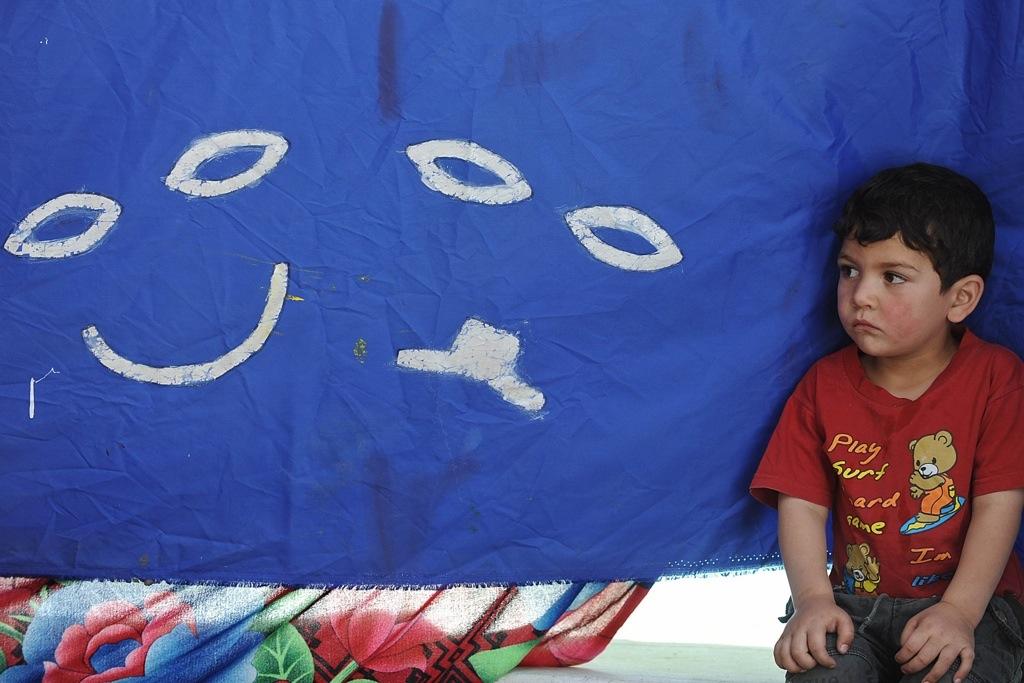Gaiety battles despair as Kabul’s expats trip the light fantastic
An Afghan child looks on as others rehearse for a performance on child labor at the Afghan Mobile Mini Circus for Children in Kabul on June 11, 2011.
KABUL, Afghanistan — I rarely make the expatriate scene these days, but last night I went to a party for a dear friend who was combining her birthday and leaving celebrations.
Documentary filmmakers were there in abundance, along with several journalists and some practitioners of that mysterious art known as “media development” — which often seems to involve training Afghan reporters to do things that are still all but impossible in this country.
There was laughter and bonhomie and dancing under the stars. The wine flowed freely, mojitos were handed around, and a case of beer mysteriously appeared when supplies ran low. So by midnight tongues were loosened perhaps a bit more than was good for any of us.
That’s when I realized that in almost every conversation I had had, in over six hours of mingling and laughter, there ran a current of cynicism and despair.
Many of those present were preparing to leave; not in the satisfaction of a job well done, or even in fear for their lives in the steadily deteriorating security situation. Rather, it was an abandonment of hope that was driving people out.
“I am just so tired of being angry,” said one journalist, who had been in the country for years. “I will come back, but I refuse to live here ever again.”
I know how she feels. After nearly seven years in Afghanistan, I am finding that rage and frustration constitute my normal state. I cannot seem to square the circle of the current narrative.
My inbox is clogged with reports of NATO casualties, while I read more and more triumphal accounts of “momentum reversed,” “tides turned,” and “the Taliban cleared from the heartland.”
If Kandahar and Helmand are so clear these days, then who is killing all the NATO soldiers whose deaths — several per day — are recorded in the terse prose of the military’s media service?
“An International Security Assistance Force service member died following an improvised explosive device attack (or insurgent attack, or battle-related injury) in southern Afghanistan today,” is a typical entry.
I recently read a blog in Time magazine in which a colonel (unnamed) could barely contain his fury:
“The mendacity is getting so egregious that I am fast losing the ability to remain quiet; these yarns of ‘significant progress’ are being covered up by the blood and limbs of hundreds — HUNDREDS — of American uniformed service members each and every month,” writes the colonel. “It's sheer madness, and so far as I can tell, in the mainstream media and reputable publications, it is going almost entirely without challenge.”
The blogger is right: there is little critical examination of the circular argument for the war. We have to stabilize Afghanistan in order to be able to stabilize Pakistan, which is causing instability in Afghanistan.
We have to destroy Afghanistan’s ability to provide safe havens for terrorists so that the terrorists in Pakistan do not decide to cross back over the border.
But what difference does it make if the terrorists are in Quetta or Kandahar? As we have seen from attacks in Europe, India, the United States and elsewhere, the lack of a base in Afghanistan did not slow down Al Qaeda all that much, at least as long as its leader was comfortably ensconced in Abbottabad.
We are restricted in our actions vis a vis Pakistan, a nuclear power with more than 180 million people. So we console ourselves that we are making progress against a poorly defined, ill-equipped enemy in a country of 30 million whose president cannot seem to decide whether we are his curse or his salvation.
Afghan President Hamid Karzai reportedly asked U.S. President Barack Obama not to draw down U.S. forces too steeply this summer, since the Afghan forces were unable to cope with the insurgency on their own.
This just a little over a week after Karzai threatened NATO that they would soon be seen as “an occupying force” if they did not stop night raids and airstrikes in Afghanistan.
Among last night’s guests, whose combined Afghan experience could be counted in centuries, the outlook was bleak.
When asked what to expect over the next few years, most shrugged and said, simply, “civil war.” The few Afghans sprinkled in the crowd were similarly pessimistic.
“This is the country where I was born, and I love it,” said one returning Afghan, who now holds a passport from a European country. “But when I see what is happening here, I just want to go back to my real life.”
As I left the festivities in the wee hours, someone was passing around a bottle of rum; “Dancing Queen” was on the stereo system, and a very drunk bloke from Down Under was playing air guitar and singing something unintelligible.
A great party, all in all. Most of us, in the bleary-eyed, furred-tongued aftermath, will remember little except the “eat-drink-and-be-merry” side of the evening. But there was too little rum for me to block out the likely continuum: “… for tomorrow all hell could break loose.”
The story you just read is accessible and free to all because thousands of listeners and readers contribute to our nonprofit newsroom. We go deep to bring you the human-centered international reporting that you know you can trust. To do this work and to do it well, we rely on the support of our listeners. If you appreciated our coverage this year, if there was a story that made you pause or a song that moved you, would you consider making a gift to sustain our work through 2024 and beyond?
